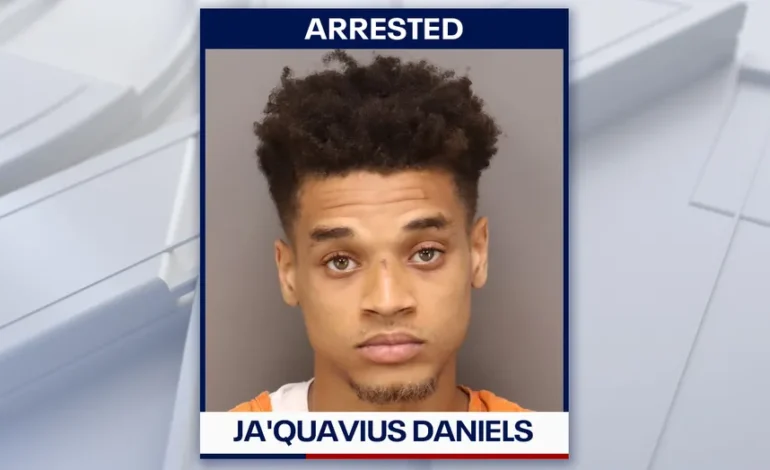
Headline: Ja’quavius Daniels Arrested in Deadly Home Invasion that Led to Self-Defense Shooting of Marcel James Williams in St. Petersburg, Florida
On April 16, 2025, Ja’quavius Daniels, 22, and Marcel James Williams, 20, were involved in a home invasion in the 3400 block of 40th St. N in St. Petersburg, Florida. During the incident, the homeowner opened fire in self-defense, killing Williams while Daniels managed to flee the scene. On April 28, 2025, Ja’quavius Daniels was arrested after he turned himself in to authorities, facing a felony murder charge for his role in the deadly confrontation.
This event has drawn significant attention, raising questions about the increasing number of home invasions, self-defense laws, and the consequences of criminal actions that put both suspects and homeowners at risk. In this article, we will explore the details of this home invasion, the subsequent legal proceedings, and the broader implications of such incidents in the context of Florida’s Stand Your Ground laws, self-defense rights, and homeowner safety.
The Home Invasion: What Happened on April 16, 2025?
On April 16, 2025, at around 2 a.m., the St. Petersburg Police Department (SPPD) responded to a call about a home invasion in the 3400 block of 40th St. N. According to police reports, Ja’quavius Daniels and Marcel James Williams unlawfully entered the residence, which was occupied by a homeowner who was inside at the time. The details of how the suspects entered the home, whether through force or another method, are still being reviewed by law enforcement, but the key point is that the homeowners were confronted by the two men while inside their own property.
As the suspects made their way into the home, the homeowner reportedly feared for their life and decided to take action to protect themselves. According to the St. Petersburg Police, the homeowner fired shots, striking Marcel James Williams, who was later identified as the victim of the shooting. Williams was transported to a local hospital but tragically succumbed to his injuries and was declared dead upon arrival.
The second suspect, Ja’quavius Daniels, fled the scene shortly after the shooting, and law enforcement began a search for him. Witnesses and investigators have not yet confirmed whether Daniels was also armed or what his specific role was in the home invasion. However, his actions, along with Williams‘s involvement, have led to the charge of felony murder against him.
Self-Defense and the Legal Implications: Was It Justified?
The shooting death of Marcel James Williams in the context of this home invasion raises important questions regarding self-defense laws and the use of lethal force. In Florida, a state with some of the most permissive self-defense laws in the nation, the Stand Your Ground law allows individuals to use deadly force if they believe they are facing an imminent threat of death or great bodily harm.
In this case, the homeowner may have felt that their life was in danger, especially if the intruders were armed or acting aggressively. Florida’s Stand Your Ground law allows people to defend themselves without the duty to retreat, even if they are in their own home. The homeowner’s decision to use lethal force to stop the invasion would, therefore, fall under the protection of self-defense if they could show that they feared for their safety or the safety of others inside the residence.
The key legal question in this case is whether the homeowner’s actions in firing at the intruders were proportionate to the perceived threat. While the law provides protection for individuals who use deadly force in self-defense, it does not absolve the homeowner from all responsibility. The use of force must be deemed reasonable and not excessive under the circumstances.
As law enforcement continues to investigate, the St. Petersburg Police will likely review any evidence—such as surveillance footage, witness testimonies, and forensic evidence—to determine whether the shooting was justified. If the homeowner is found to have acted in self-defense, it is unlikely that any charges will be brought against them. However, if the situation is determined to be a case of excessive force or an inappropriate use of a firearm, there could be legal consequences for the homeowner.
The Arrest of Ja’quavius Daniels: Turning Himself In
After Marcel James Williams was shot and killed, the search for Ja’quavius Daniels began in earnest. The police investigation quickly identified Daniels as a key suspect in the home invasion, and law enforcement issued a manhunt for the 22-year-old suspect. Daniels, who had fled the scene of the shooting, evaded capture for nearly two weeks before eventually turning himself in to the authorities on the evening of April 28, 2025.
Daniels’ decision to turn himself in may have been influenced by the mounting pressure from law enforcement and the community, along with the widespread media coverage of the shooting. Authorities had been actively searching for Daniels, and tips from the community likely played a role in locating him.
Upon his surrender, Ja’quavius Daniels was charged with felony murder, as well as other charges related to his involvement in the home invasion. The legal basis for the felony murder charge stems from Daniels’ alleged participation in the crime, even though he did not directly cause the death of Williams. Under felony murder statutes, individuals involved in a violent crime that results in a death, even if the death was unintentional, can be charged with murder.
Felony murder laws in Florida apply when someone is killed during the commission of a felony crime—such as burglary or robbery. The fact that Daniels was involved in the home invasion that led to the death of Williams makes him liable for the murder charge, regardless of his specific actions during the shooting.
Investigation and Potential Charges: What Comes Next?
As Ja’quavius Daniels now faces felony charges, St. Petersburg Police are continuing to investigate the events leading up to the shooting. Authorities have not disclosed the exact role that Daniels played during the home invasion and shooting, but they have confirmed that he was with Marcel James Williams when the two attempted to unlawfully enter the residence.
The investigation will focus on several key factors:
- Daniels’ Role in the Home Invasion: Investigators will seek to determine whether Daniels was directly involved in the attempt to break into the home or if he was merely an accomplice to Williams. The charge of felony murder could be influenced by whether Daniels actively participated in the crime or whether he simply acted as a getaway driver or accomplice.
- The Exact Cause of Death: Investigators will also work to confirm the exact circumstances surrounding the shooting. Police will examine whether Williams posed an immediate threat to the homeowner and whether the homeowner’s response was proportional to the situation.
- Witness Statements: Law enforcement will rely on witness statements to help piece together the events of the shooting. This may include testimonies from the homeowner, neighbors, and any potential eyewitnesses who may have seen Daniels and Williams prior to or during the incident.
- Forensic Evidence: Evidence collected from the scene, including firearm residues, bullet trajectories, and surveillance footage from nearby businesses or homes, will be crucial in determining the facts of the case. Forensic experts will also analyze the weapons involved to see if they were legally registered or if Daniels and Williams had access to unregistered firearms.
Community Response and Impact
The fatal shooting and arrest of Ja’quavius Daniels have sparked significant debate in the St. Petersburg community, particularly regarding self-defense and home invasion laws. Many residents have expressed their concern about the growing number of violent crimes in the area, while others have shown support for the homeowner’s decision to protect themselves during the invasion.
Local community leaders have called for more awareness around home defense laws, urging citizens to know their rights in situations involving self-defense. The use of deadly force in self-defense, while legal in many instances, is often a subject of controversy. Critics of self-defense laws argue that there is a fine line between protecting oneself and using disproportionate force.
Meanwhile, advocacy groups against violent crime have expressed their support for the authorities’ efforts to investigate this case thoroughly. They have called for stronger preventive measures against home invasions and emphasized the need for increased community policing and crime prevention strategies.
The Broader Context: Domestic Violence, Crime Rates, and Self-Defense Laws
This case highlights the broader issue of crime and violence in urban areas like St. Petersburg, where violent crime, including home invasions, has been rising in recent years. According to local law enforcement statistics, home invasions and other violent crimes have been steadily increasing, leading to a heightened sense of vulnerability among residents.
Additionally, the legal aspects of self-defense and the use of deadly force have been a topic of ongoing debate in the United States, particularly with the growing number of Stand Your Ground laws. These laws, which allow individuals to use force to defend themselves without the duty to retreat, have been controversial due to the potential for misuse or overreaction in certain situations.
This incident also calls attention to the broader issue of community safety and the challenges faced by law enforcement in addressing violent crime. As St. Petersburg and other cities work to reduce crime rates and ensure the safety of their residents, there is a growing call for stronger crime prevention policies, community engagement, and effective policing practices that can help reduce the occurrence of violent incidents like the one involving Daniels and Williams.
Conclusion: Legal, Social, and Community Implications
The case involving Ja’quavius Daniels, Marcel James Williams, and the homeowner’s actions during the home invasion raises important legal, social, and community concerns. As Daniels faces felony murder charges and the investigation into the death of Williams continues, the case underscores the complexities of self-defense, the role of law enforcement, and the impact of violent crime on communities.
This tragic incident serves as a stark reminder of the dangers associated with home invasions and the difficult decisions homeowners face when confronted with criminal behavior. It also highlights the need for comprehensive crime prevention measures, as well as more nuanced discussions around self-defense laws in the U.S.
As the legal process unfolds, it will be crucial for law enforcement to provide clarity and transparency regarding the events of April 16, 2025, and for the community to continue working together to address the issues of crime, violence, and public safety.
This detailed analysis not only explores the events surrounding the home invasion and subsequent death of Marcel Williams but also dives deeply into the implications for legal reform and community engagement in tackling violent crime.



